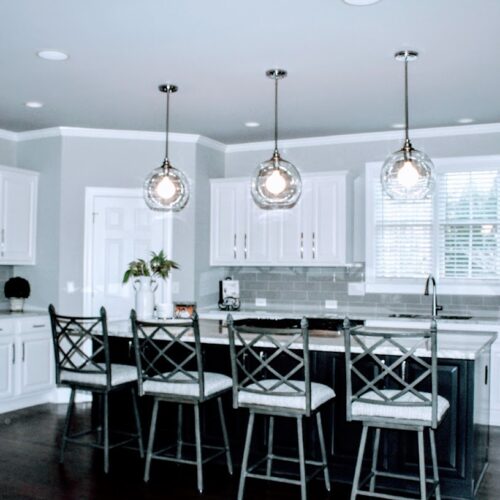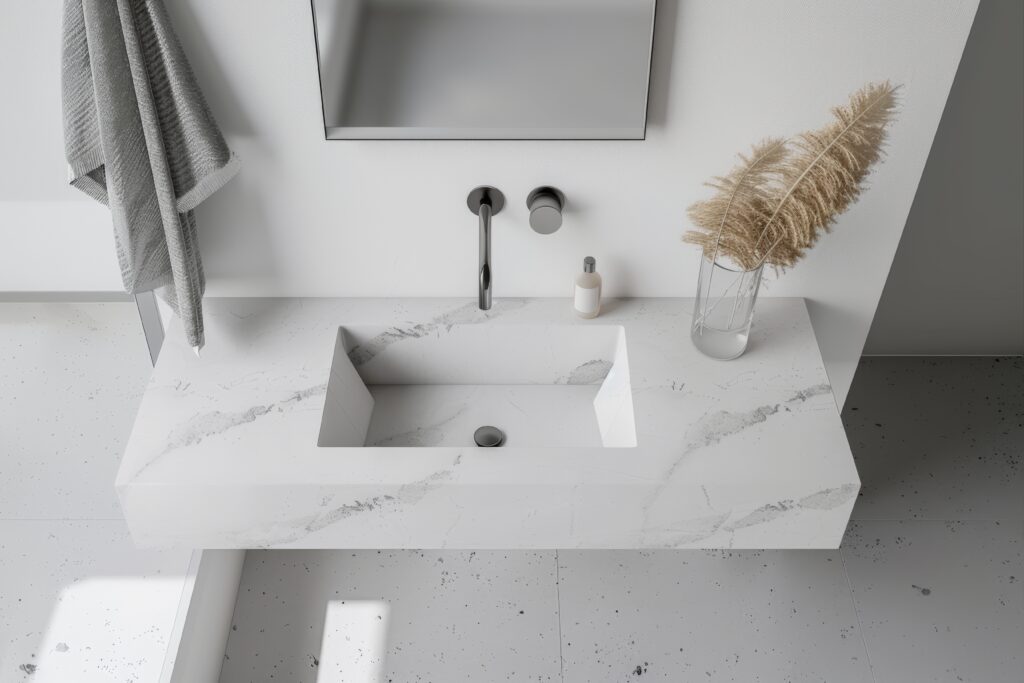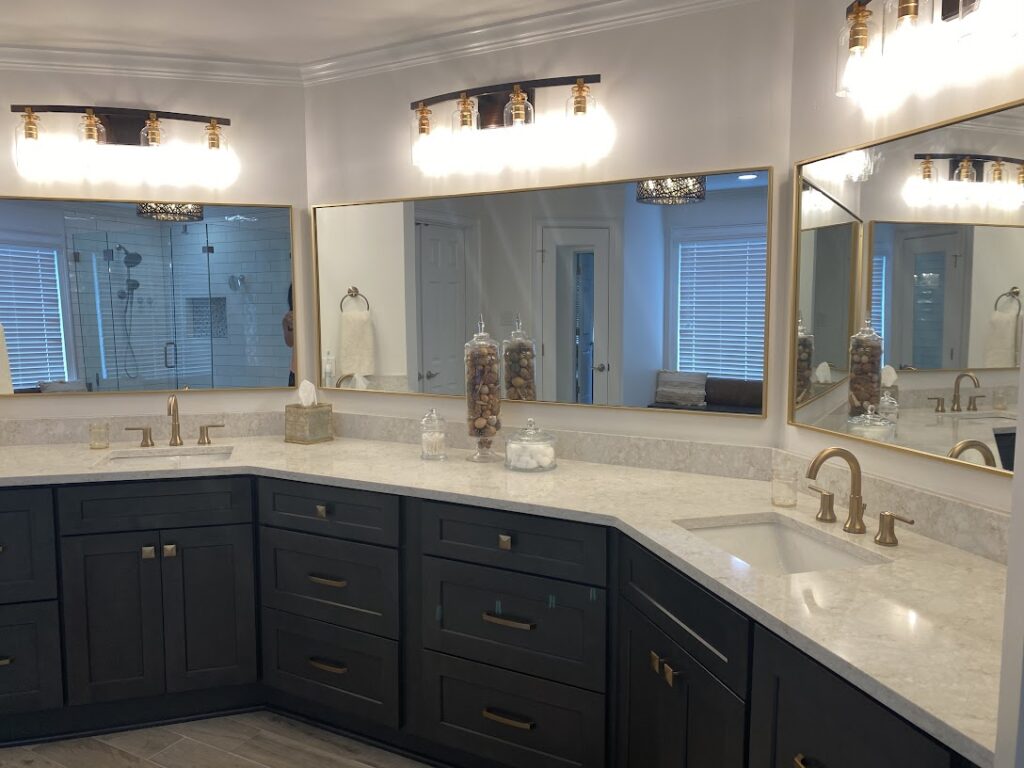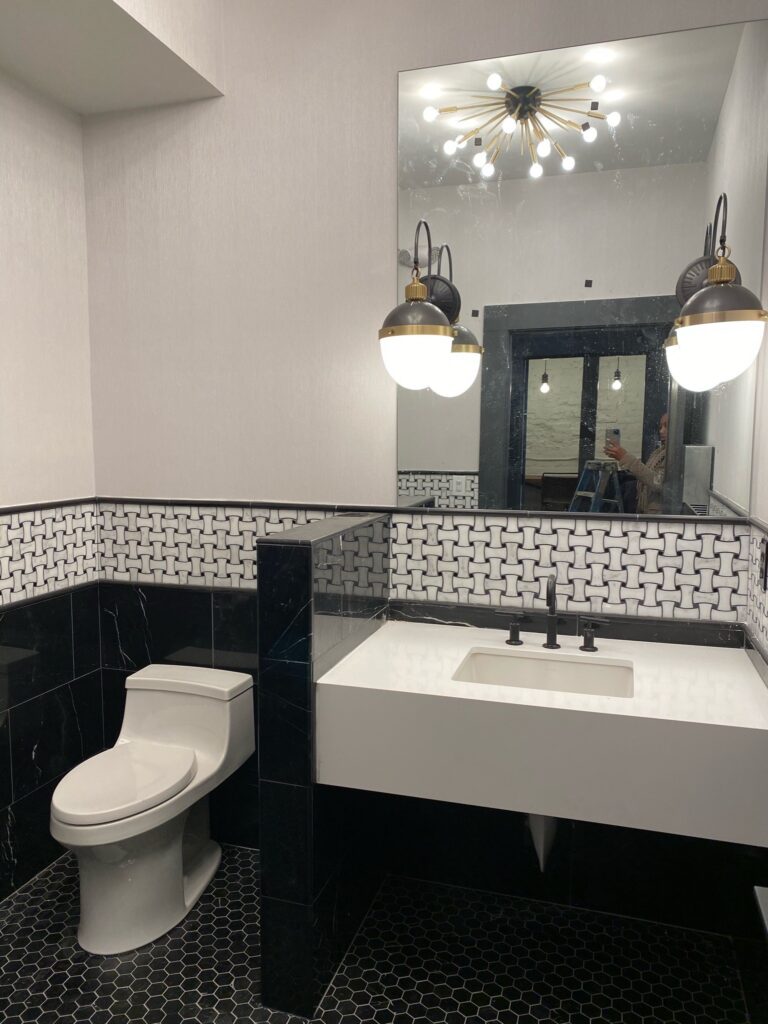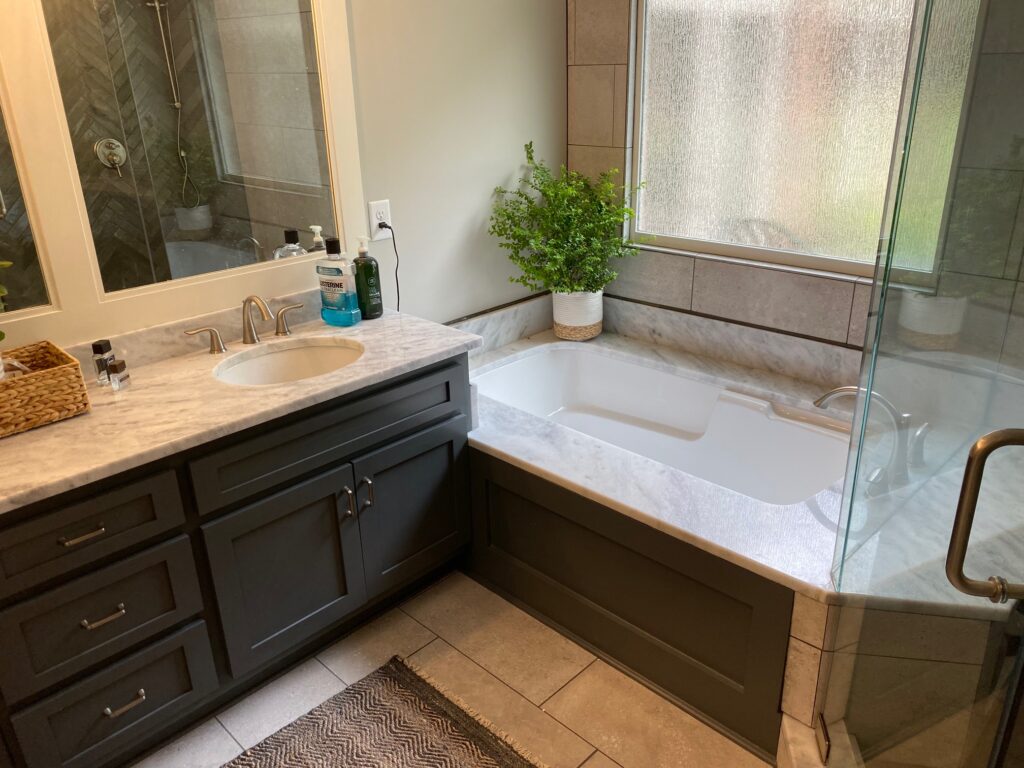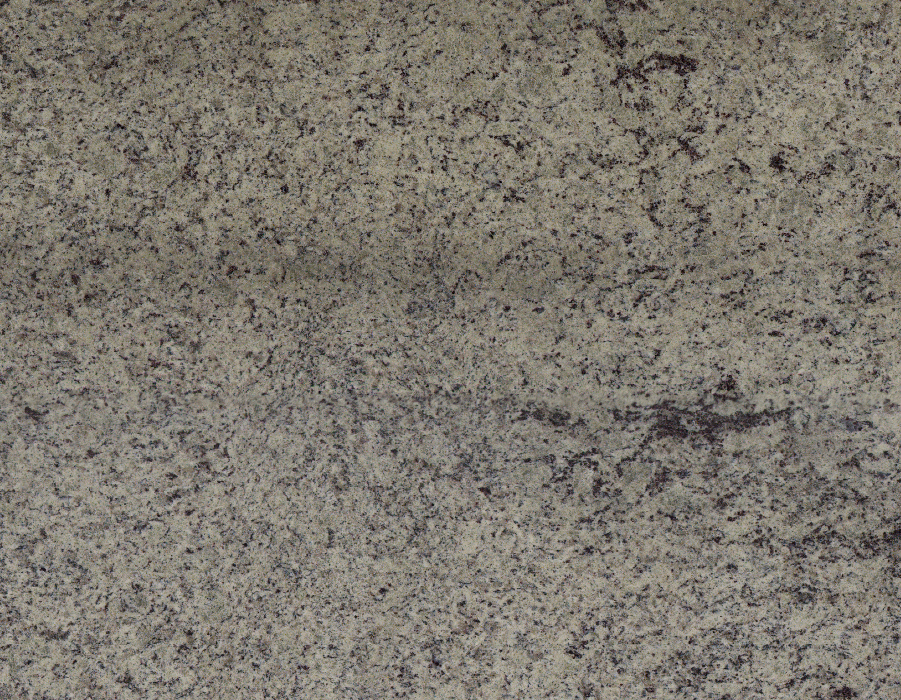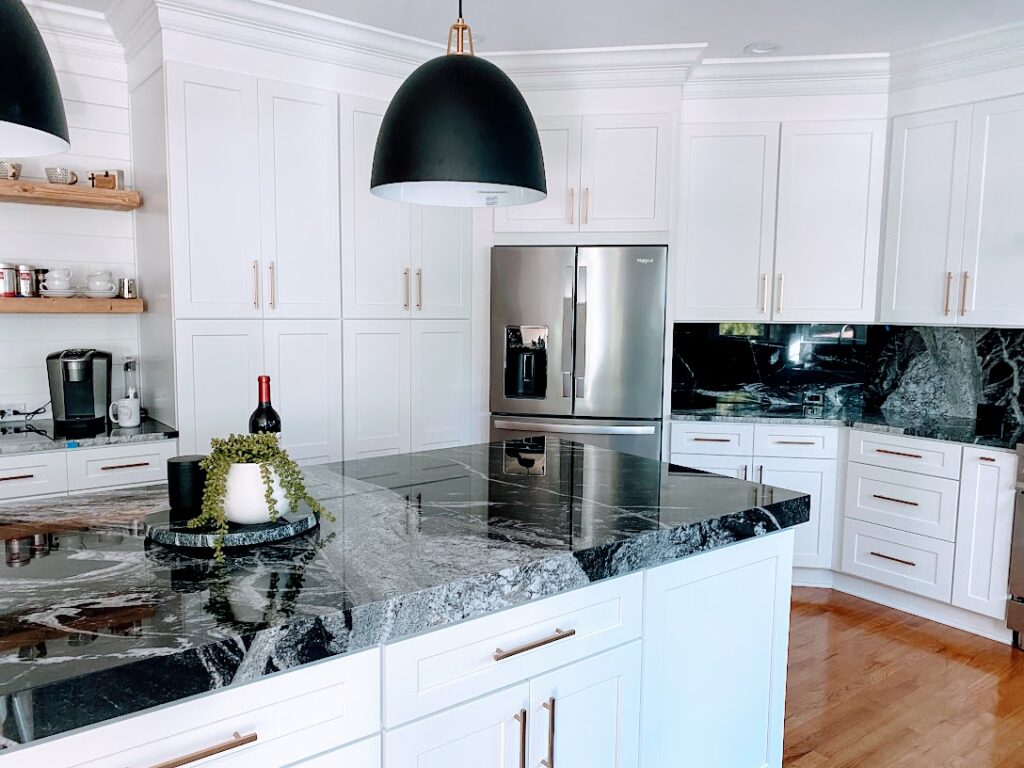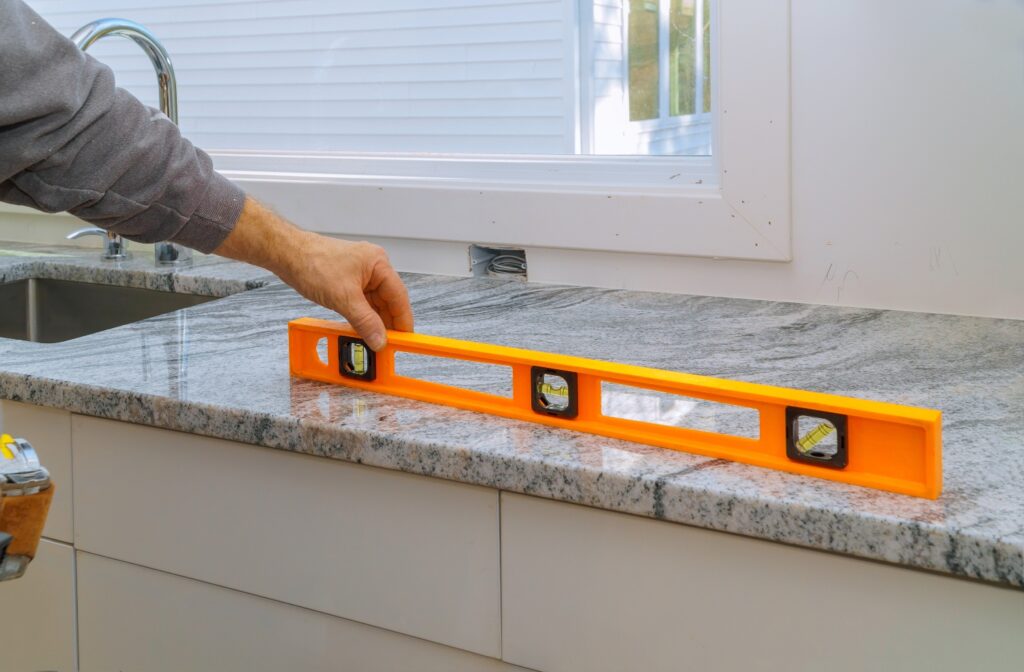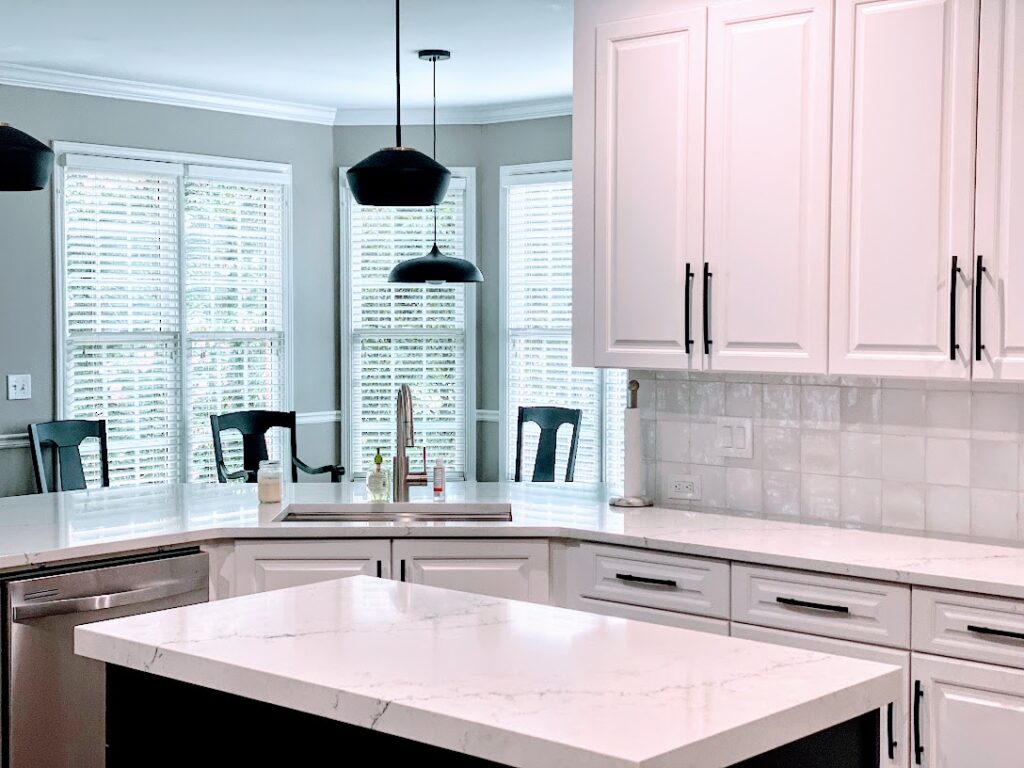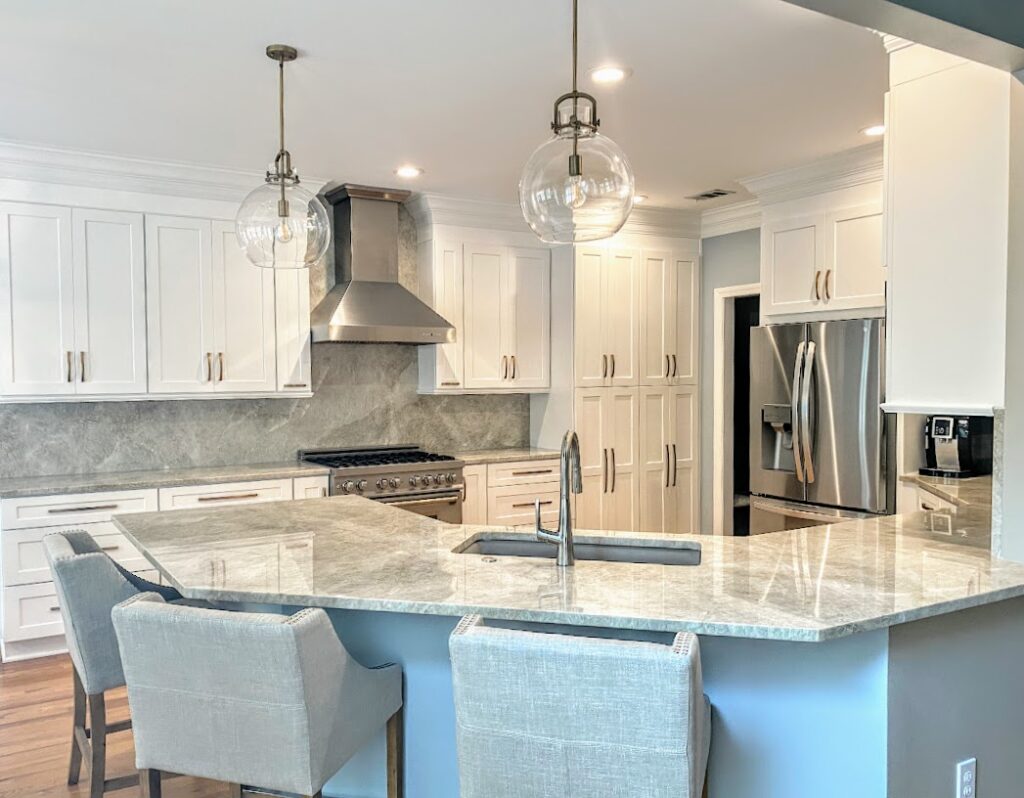Quartz Countertops vs. Glass Countertops
When considering a new countertop, quartz and glass might catch your eye with their distinct qualities. Quartz promises resilience and minimal upkeep, while glass captivates with its sleek, modern aesthetic. But which one aligns best with your needs? There’s more than just the surface appearance, like how each material stands up to daily wear or fits your budget. You might find yourself weighing the trade-offs between beauty and practicality. Stay with us to uncover the nuances that could influence your decision and perhaps discover something unexpected about these two popular choices.
Material Composition and Characteristics
Understanding their material composition and characteristics is crucial when choosing between quartz and glass countertops.
Quartz countertops are engineered stone surfaces composed of about 90-95% natural quartz crystals, combined with resins, polymers, and pigments to create a sturdy, non-porous slab. This manufacturing process results in a durable, scratch-resistant surface that’s reliable for various kitchen and bathroom applications. You’ll appreciate quartz’s ability to withstand heat and resist stains, making it a low-maintenance option for busy households.
On the other hand, glass countertops are crafted from recycled glass pieces embedded in a base material like cement or resin or made from a single solid glass slab. This gives them a unique, contemporary look. Glass countertops are non-porous and resistant to bacteria, ensuring a hygienic food preparation surface. They’re also heat-resistant and can handle hot pots and pans, although you should be cautious with heavy impacts as glass can chip or crack.
Both quartz and glass offer environmental benefits but in different ways. Quartz countertops, while not entirely natural, utilize abundant materials and often incorporate recycled content. Glass countertops often use recycled glass, which reduces landfill waste and can be a more sustainable choice if that’s your priority.
When deciding between these two materials, consider your lifestyle and your kitchen or bathroom use. Each has its strengths, and understanding these characteristics will help you make an informed choice that suits both your practical needs and your personal style.
Aesthetic Appeal and Design Options
Embracing the unique aesthetic appeal and versatile design options of quartz and glass countertops can elevate your kitchen or bathroom space.
Quartz countertops offer a polished, sophisticated look that easily complements various traditional and modern styles. Quartz comes in a wide range of colors and patterns, allowing you to mimic the appearance of natural stones like marble or granite or opt for solid, consistent hues. Its engineered nature means you can achieve a uniform aesthetic without unexpected color variations, giving your space a cohesive and refined appearance.
On the other hand, glass countertops introduce a contemporary and striking element to your design. The sleek and shiny surface of the glass adds a touch of modern elegance, making it an eye-catching centerpiece.
Glass countertops can be customized in various textures and colors, from clear and frosted to vibrant and patterned. This flexibility allows you to infuse your personality into the space, creating a truly unique look. Additionally, glass can be backlit, adding a dramatic effect that enhances the ambiance of your room.
When choosing between quartz and glass, consider your space’s lighting and existing decor. Quartz’s matte or glossy finishes can harmonize with warm, natural tones, while glass’s reflective quality pairs beautifully with bold, contemporary palettes.
Both materials offer unique opportunities for personal expression, allowing you to tailor your countertops to your aesthetic preferences. Whether you lean towards quartz’s timeless elegance or glass’s modern allure, your choice will undoubtedly make your space stand out.
Durability and Maintenance
Understanding the durability and maintenance of your countertops is crucial when deciding between quartz and glass. Both materials have unique characteristics that affect how they’ll hold up over time and what kind of care they’ll require.
Quartz countertops are known for their exceptional durability. They’re engineered from natural quartz crystals mixed with resins, making them resistant to scratches, chips, and stains. You won’t have to worry much about everyday wear and tear.
Quartz is non-porous, meaning it doesn’t absorb liquids, which makes cleaning a breeze. A simple wipe with a damp cloth and mild soap is usually all it takes to maintain their shine. Plus, you don’t have to seal them like with other countertop materials, so you save on maintenance time and effort.
Glass countertops, on the other hand, offer a modern and unique look, but they require a bit more attention in terms of durability and care. While tempered glass is quite strong, it’s still more susceptible to scratches and chips than quartz.
You’ll need to use cutting boards to avoid damage. The surface can also show fingerprints and smudges more easily, so regular cleaning is necessary to keep it looking pristine. Use a glass cleaner and a soft cloth to maintain its clarity.
Cost Comparison
Comparing costs is a vital step in choosing between quartz and glass countertops. Both materials have unique qualities and pricing structures that can significantly impact your budget.
Quartz countertops are generally more affordable than glass countertops. This range allows you to select from various styles and qualities without breaking the bank.
Glass countertops, however, tend to be on the pricier side. Glass’s higher price often reflects its customizability and unique aesthetic appeal. If you’re leaning towards a more artistic or personalized kitchen or bathroom space, you might find glass worth the extra investment.
When budgeting, long-term costs beyond the initial installation should also be considered. Quartz countertops are low-maintenance, reducing the need for regular upkeep expenses. They resist stains, scratches, and heat, providing a durable option that retains its appearance with minimal effort.
Glass countertops, while stylish, can incur higher maintenance costs. They may scratch or chip more easily and sometimes require professional repairs or replacements, adding to your expenses over time.
Environmental Impact
While cost is a significant factor, it’s also important to consider the environmental impact of your countertop choice. When you’re weighing quartz against glass countertops, understanding their eco-friendliness can guide you to a more sustainable decision.
Quartz countertops are engineered from natural quartz, an abundant resource that requires significant energy to extract and process. The production involves mining, which can lead to habitat destruction and soil erosion. Additionally, manufacturing quartz countertops demands high energy consumption, primarily due to the heat and pressure required for production.
Although many manufacturers strive to minimize their carbon footprint by using recycled materials, the process still leaves an environmental mark.
On the other hand, glass countertops have a different ecological footprint. They’re often made from recycled glass, significantly reducing waste and the need for raw materials. Using recycled glass conserves resources and reduces energy consumption since recycling glass requires less energy than producing new glass from raw materials.
Furthermore, glass countertops can be recycled again at the end of their lifecycle, making them a highly sustainable option.
However, it’s worth noting that the production of glass countertops can involve the use of resins and binders, some of which may not be eco-friendly. As you explore your options, seek out manufacturers that commit to using low-VOC (volatile organic compounds) binders and sustainable practices.
Ultimately, choosing between quartz and glass countertops should include reviewing manufacturers’ environmental practices. Your decision can contribute to a healthier planet by opting for products that prioritize sustainability.
Frequently Asked Questions
How Do Quartz and Glass Countertops Affect Indoor Air Quality?
You’re wondering how countertops impact indoor air quality. Quartz countertops don’t emit volatile organic compounds, improving air quality. Glass countertops can be eco-friendly but ensure low adhesives to minimize potential VOC emissions. Choose wisely!
Are Quartz or Glass Countertops More Resistant to Heat Damage?
You’re considering heat resistance, and it’s crucial. Quartz countertops generally handle heat better but are not invincible. Glass countertops are more vulnerable to heat damage, so always use trivets or pads to protect the surface.
Can Quartz or Glass Countertops Be Customized for Unique Kitchen Layouts?
You can definitely customize both types for unique kitchen layouts. Quartz offers flexibility with different shapes and finishes, while glass provides options with various colors and textures. Choose based on your design preferences and practical needs.
Which Countertop Material Is Easier to Repair if Damaged?
Quartz is generally easier to repair when your countertop gets damaged than glass. Quartz’s solid surface allows for simple patching and refinishing. Glass, however, often requires complete replacement due to its brittle nature.
Do Quartz or Glass Countertops Stain More Easily With Common Kitchen Substances?
You’re wondering about stain resistance. Quartz countertops resist stains better because they’re non-porous, while glass countertops can easily stain with substances like wine or coffee. So, if you prioritize easy maintenance, quartz is your best bet.
Conclusion
When choosing between quartz and glass countertops, consider your lifestyle and needs. Quartz’s exceptional durability and low maintenance make it perfect for busy spaces, offering a natural stone look without the hassle. While glass countertops are stylish and customizable, they require more upkeep and are prone to chipping. In terms of cost, quartz is the more affordable and resilient choice. Ultimately, quartz provides a practical and visually appealing solution for most homeowners.

Val Carvalho is a manager at Atlanta Stone Creations, with nearly two decades of experience in the stone and design industry. In addition to her leadership role, Val plays a key part in sales and design, bringing creativity, precision, and a strong sense of style to every project. Known for her warm and collaborative approach, she builds strong relationships with both her team and her clients. Val is passionate about delivering beautiful, high-quality results and creating an exceptional experience from start to finish.

